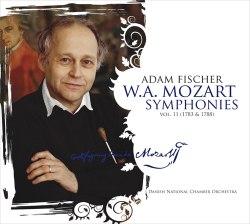| 
|
Wolfgang Amadeus MOZART (1756-1791)
Symphony No. 36 “Linz” in C [28:24]
Symphony No. 39 in E flat [28:55]
Danish National Chamber Orchestra/Adam Fischer
rec. August and December 2012 and February 2013, Studio 2, DR Koncerthuset, Copenhagen
DACAPO 6.220546 SACD [57:19]
Wolfgang Amadeus MOZART (1756-1791)
Symphony No. 40 in G minor [29:48]
Symphony No. 41 in C [34:44]
Danish National Chamber Orchestra/Adam Fischer
rec. February 2013, Studio 2, DR Koncerthuset, Copenhagen
DACAPO 6.220639 SACD [64:32]
Adam Fischer’s Mozart symphony cycle concludes with the last symphonies, and it does so in terrific style. These are performances which rank among the best played on modern instruments: they may be played on today’s strings and winds, but they have quick tempos, sharp and snappy rhythms and many repeats intact. The timpanist pounds thrillingly with hard sticks; the conducting makes Mozart more of a fiery human and less of a powder-wigged demigod; the acoustic responds with a barely-tamed echo. The result is Mozart symphony performances which feel human, but like a jolly, effusive human, the type you meet at a party or see on TV and describe as being “larger than life”. If Karl Böhm’s Mozart is a Roman god sculpted from marble, Adam Fischer’s Mozart is out back sipping wines with Bacchus.
A similar series of Mozart symphonies came out not so long ago on Linn. Charles Mackerras, too, offered modern instruments, the scholarship of the period-practice movement, a chamber-sized orchestra, lively speeds, and an exuberant, dancing manner. His Scottish Chamber Orchestra, like Fischer’s Danish group, easily discards any criticism of “regional” ensembles, for they both offer world-class playing among the best available. The difference is in how many idiosyncrasies or mannerisms you want and also whether you want the whole symphony cycle; Mackerras/SCO only recorded 9 symphonies, including the final six.
Put simply, Fischer has more quirks. He’ll sometimes pause before a phrase, or more frequently call for an unexpected quieting-down, especially when something is being repeated. A slow-down lasting only two or three seconds might give an extra jolt to what follows. In the first 90 seconds of the “Jupiter” symphony, I count three separate places where the violins use phrasings and dynamic adjustments you will not hear elsewhere. Notice in the same movement the trumpets adding little crescendos to their notes in places like 4:20. The Freiburg Baroque albums with René Jacobs are similar in their intrepid spirit, only with period instruments.
I think this means that I’d support Mackerras and the Scottish Chamber Orchestra - my favorite recordings of the “great” symphonies - as reference versions, or first-choice, but with these discs as a strong contender for collectors and Mozart lovers. I’ll certainly be keeping Fischer along with Jacobs on my metaphorical “top shelf”. Additionally, Fischer is probably my suggestion if you want a good complete box set of all the symphonies; I haven’t heard Hogwood or Pinnock, to be fair, but the earlier Mackerras cycle with the Prague Chamber Orchestra just does not have the same vigor as these recordings, or the Scottish albums from the same conductor.
All in all, a truly spontaneous, exciting, glorious finish to an important Mozart cycle. Listening to these albums it’s possible to hear the symphonies as if they were new again. I downloaded my copies from ClassicsOnline, which has FLAC and MP3 options, plus the booklet notes.
Brian Reinhart
Masterwork Index: Mozart symphonies
 |
 |
|














